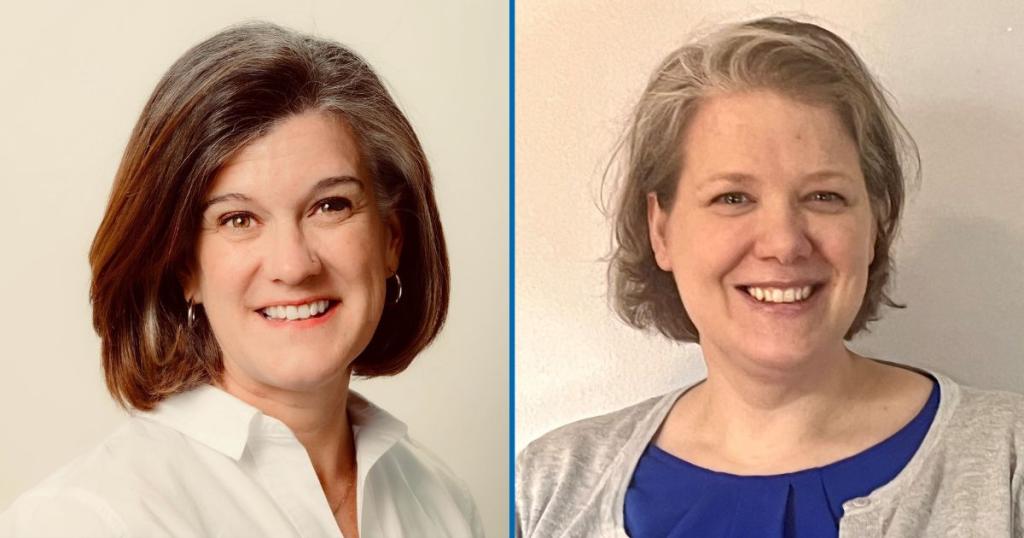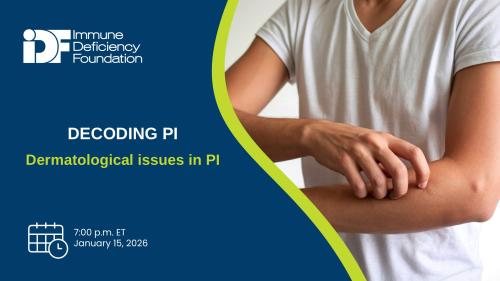
-
Understanding primary immunodeficiency (PI)

Understanding PI
The more you understand about primary immunodeficiency (PI), the better you can live with the disease or support others in your life with PI. Learn more about PI, including the various diagnoses and treatment options.
-
Living with PI
-
Addressing mental health
-
Explaining your diagnosis
- General care
- Get support
- For parents and guardians
-
Managing workplace issues
- Navigating insurance
-
Traveling safely

Living with PI
Living with primary immunodeficiency (PI) can be challenging, but you’re not alone—many people with PI lead full and active lives. With the right support and resources, you can, too.
-
Addressing mental health
-
Get involved

Get involved
Be a hero for those with PI. Change lives by promoting primary immunodeficiency (PI) awareness and taking action in your community through advocacy, donating, volunteering, or fundraising.
-
Advancing research and clinical care
-
Research Grant Program
-
Consulting immunologist
-
Diagnosing PI
-
Getting prior authorization
-
Clinician education
-
Survey research
-
Participating in clinical trials

Advancing research and clinical care
Whether you’re a clinician, researcher, or an individual with primary immunodeficiency (PI), IDF has resources to help you advance the field. Get details on surveys, grants, and clinical trials.
-
Research Grant Program

IDF’s Nurse Advisory Committee (NAC) has appointed two new members, Dr. Kristina Bolling, who worked in COVID clinics during the pandemic before transitioning to immunology, and certified nurse practitioner Laura Lucas Youngblood, who is studying risks pediatric patients face using intravenous immunoglobulin (IVIG) replacement therapy.
An all-volunteer committee, the NAC contains members with nursing backgrounds who practice in primary immunodeficiency-related fields. The group meets quarterly and completes projects such as updating the IDF Guide for Nurses and the IDF Patient & Family Handbook.
As an immunology nurse practitioner, Bolling cares for patients from newborns to senior citizens with primary and secondary immunodeficiencies at the Children’s Hospital of Wisconsin, a national referral center for patients with granulomatous and lymphocytic interstitial lung disease (GLILD). She is also a member of the institution-wide immune dysregulation team.
Bolling holds both her master’s and a doctorate in nursing practice from Simmons University. She worked various healthcare jobs from emergency medical technician (EMT) to lab technician before pursuing nursing, where she held positions in the emergency room, urgent care, and COVID clinic. Originally from Finland, she studied genetics at the University of Helsinki and is passionate about biomedicine. Bolling appreciates the challenge of working in the PI field—and the rapidly evolving ways scientific discovery is advancing diagnoses and treatments.
“What I like are the patients and the puzzles they present because every patient is different,” said Bolling. “And we’re lucky. We’re in a super exciting time when we're doing things like digging into pathways and genetics and things like that where we can do more than just immunoglobulin replacement. We get to try and drill down to the bottom of what's going on.
“The immune system is just fascinating in general. But ultimately our patients are what make it worth it, right? They come in with their stories and they've been so resilient over all these years and it's just kind of a drive to try and help them figure out what we can do to make things better.”
Bolling said that with immunology progressing quickly, she looks forward to assisting IDF in keeping materials up to date for patients.
“I’m very excited to serve on the NAC. It was a long-term goal of mine so the fact that I’m able to do it now, I’m just very honored and excited about it because this is just such a fantastic collection of knowledge in one place,” said Bolling.
The lead nurse practitioner at Children’s Healthcare of Atlanta (CHOA) in immune dysregulation and bone marrow transplant, Youngblood treats children with PI and other immune dysregulation and autoimmune diseases.
“We do a lot of genetic testing trying to figure out the underlying source,” said Youngblood, who has worked in the position for seven years and watched the patient load grow from 150 to 750. “Genetic identification of the conditions is such an up-and-coming way of treating disorders like inflammatory bowel disease (IBD), for example, in kids. For so many years, it was treated specifically as a gastrointestinal disease and there were questions about why these kids were getting these conditions. Now we know that hundreds of genes have been identified that are immune disorders.”
After earning her nursing degree in 1993, Youngblood worked in pediatrics at a local hospital and was inspired to move into pediatric oncology after in-service work at a summer camp for children with cancer. She took a position at CHOA and earned her master’s degree in nursing (MSN) and nurse practitioner (NP) certification with a subspecialty in pediatric hematology-oncology from Emory University. She has over 25 years of experience in primary care and pediatric hematology/oncology and took additional classes related to immunology when she accepted her current role at CHOA.
“I think it's so interesting to put the puzzle pieces together. This is true in the PI patients but also in those with immune dysregulation who have bounced around to several places before they get to us. It’s super rewarding to be able to put their story together with their labs and then ultimately their genetics and come up with an answer and a plan for families, some of whom have been drifting around and have had to fight when they know there is something not right with their child. We see that a lot,” said Youngblood.
Youngblood is earning her doctorate in nursing through the University of North Georgia and her PhD thesis focuses on how IVIG affects pediatric patients. A treatment given to children with PI, cancer, and rheumatological conditions like Kawasaki’s disease, IVIG can result in post-infusion migraines, meningitis, and clotting issues. Youngblood is designing a pre-infusion evaluation that would identify pre-existing conditions in children and allow providers to take steps, such as slowing infusion rate and administering pre-hydration, to mitigate the effects of the medication.
“A lot of the kids are adolescents, and they feel horrible after they take it, and we worry about their compliance. They don't want to do it anymore. Are they going to keep it up? And we want to learn more about what triggers these side effects,” said Youngblood.
“The preassessment will be a list they can go through and maybe we can create a risk score to flag the patient. It will give providers more information when they are filling that dose for IVIG and maybe have them make some changes in how it runs or look for effects afterward.”
Youngblood is excited to lend her expertise to the NAC, especially to empower teens and young adults to navigate their healthcare needs.
“We have a ton of kids that, as they age out, are terrified because the adult world is just different. And they wonder, how do I do this? So, I think teaching them self-advocacy is so important. Yes, you can travel, you can go study abroad. You can do all this stuff. Don't hold yourself back. This shouldn't be a limiting factor for you, but you have to know how to handle it, what you should know, and what you should and shouldn’t avoid.”
Youngblood is also interested in improving resources related to bone marrow transplants, as about 15 percent of her patients receive BMTs as a treatment.
“I'd love to be a part of that. But again, I'm excited to be involved in all of it. Wherever I'm needed, I will go,” said Youngblood.
Your Situation
Related resources
Sign up for updates from IDF
Receive news and helpful resources to your cell phone or inbox. You can change or cancel your subscription at any time.





The Immune Deficiency Foundation improves the diagnosis, treatment, and quality of life for every person affected by primary immunodeficiency.
We foster a community that is connected, engaged, and empowered through advocacy, education, and research.
Combined Charity Campaign | CFC# 66309




